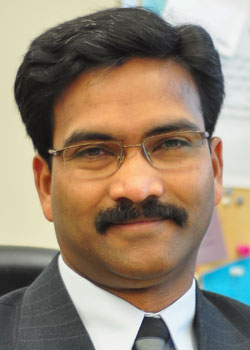 |  |
James Eudy, Ph.D. | Babu Guda, Ph.D. |
The National Science Foundation (NSF) has awarded Nebraska, Hawaii and Vermont $20 million each through its Experimental Program to Stimulate Competitive Research (EPSCoR), which promotes world-class research nationwide.
UNMC’s James Eudy, Ph.D., and Babu Guda, Ph.D., both from the UNMC Department of Genetics, Cell Biology and Anatomy, are team members of the University of Nebraska-Lincoln led $20 million, Nebraska-based research effort to improve crop productivity.
A key aim is developing new biological tools that will allow the researchers to use their findings to precisely modify plant genomes, targeting specific traits such as drought resistance or yield.
Dr. Eudy, director of the UNMC DNA Sequencing and Microarray Cores, will head the efforts of the Genomics Core in performing all the sequencing of the samples received from UNL using Next Generation DNA sequencing technology. Dr. Guda, chief bioinformatics and research computing officer, will lead the development of tools to analyze the plant root and soil microbiome data and design computational algorithms for predictive model construction and efficient data mining.
The five-year Research Infrastructure Improvement (RII) Track-1 awards will bolster science and engineering research infrastructure at multiple institutions within each of the three states. The awards are aimed at expanding research frontiers and developing a diverse and nimble workforce trained in STEM disciplines through innovative combinations of research, education and public outreach.
All three projects will advance fundamental research at the interface of science and society in ways that can be applied to other regions and pressing issues across the country and globally. Nebraska will establish a Center for Root and Rhizobiome Innovation to develop tools and technologies for more rapid, precise and predictable improvement of crops to increase production and resilience to climate change.
Other participants will include the University of Nebraska at Kearney, Doane College, and two Tribal Colleges — Little Priest Tribal College and Nebraska Indian Community College.
The research uses a holistic strategy to study root and soil microbe interactions and to develop new biological tools to enhance crop performance.
The award also will help train the next generation of young Nebraskans to pursue careers in STEM (science, technology, engineering and math fields) and contribute to the future economic development of Nebraska, said Fred Choobineh, Nebraska EPSCoR director and Blackman/Lederer Distinguished Professor of electrical and computer engineering at UNL.

Congratulations Dr. Eudy and Dr. Guda. This is an important project!